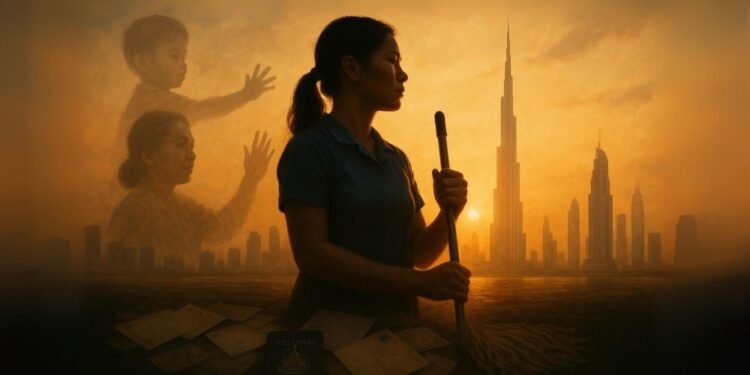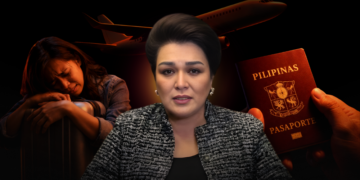In Dubai’s world-famous skyline—where supermalls, luxury towers, and five-star hotels define the landscape—there’s one constant you’ll find behind the front desk, in the kitchen, at the salon, or caring for children behind villa gates: Filipinos.
With over 450,000 Filipino workers living and working in the UAE, the majority of them in Dubai, the Filipino presence is not only deeply embedded—it’s foundational.
Filipino Workers Are the Backbone of Dubai’s Service Economy
Often described as the invisible engine of the city, Filipino labor powers key sectors that keep Dubai’s day-to-day life seamless. From domestic work to healthcare, education, hospitality, construction, and retail, Filipinos are overrepresented in service industries that demand patience, precision, and warmth.
Yet for all their visibility in labor, they remain invisible in discourse. The world praises their smiles—but rarely asks what it takes to maintain them.
According to a 2020 study published in GeoJournal, Filipinos comprise about 21% of Dubai’s total labor force. They’re considered essential, not just in the practical sense but in how they shape the cultural warmth of the city’s everyday life.
However, the cost of that presence is rarely acknowledged. Filipino workers leave behind families, partners, and their own well-being in exchange for consistent income, stability, and—often—their family’s survival.
OFW Life in Dubai: What the Public Doesn’t See
Dubai is marketed to OFWs (Overseas Filipino Workers) as the ultimate dream destination. It’s safe, modern, and offers better wages than domestic jobs in the Philippines. Yet, the lived reality for many is far from Instagram-worthy.
Many workers live in overcrowded shared units, with up to 8 or more people in a single room. Monthly salaries for service jobs can range from AED 1,500 to 2,500 (₱23,000 to ₱38,000), which seems substantial—but in a city with rising rent, transport, and food costs, this leaves little room for savings.
The Emotional Cost of Separation from Family
The emotional cost is even higher. Filipinos in Dubai often stay for years without seeing their families. A 2024 study published by the Asian Journal of Education and Social Studies found that long-term migration can cause lasting psychological stress and family disruption.
Children of OFWs often grow up with anxiety, identity challenges, and emotional gaps from missing years of parental presence. Meanwhile, parents—especially mothers—report high rates of guilt, loneliness, and depression.
For Filipino domestic workers in particular, the situation is more precarious. Under the controversial “kafala” system, domestic workers can find themselves locked into exploitative contracts with no control over their passports, limited freedom of movement, and few legal protections.
The Guardian’s 2024 feature on women working in Gulf households noted that many Filipino women endure physical isolation, mental burnout, and verbal abuse—all while caring for others.
Remittances Don’t Tell the Whole Story
Despite these struggles, they continue to send money home.
The UAE is one of the top five sources of remittances to the Philippines. According to the Philippine Statistics Authority, OFWs in the UAE contribute billions annually to the Philippine economy.
Yet that sense of economic duty brings its own pressure. Many feel they cannot quit, cannot complain, and cannot afford to fail—because back home, too many people are depending on them.
The Filtered Life of an OFW on Social Media
Social media has only complicated the picture. The public image of OFWs in Dubai is often filtered through Instagram stories, Facebook posts, and TikToks showing brunches, shopping hauls, and glamorous city backdrops.
What isn’t shown are the long hours, the missed birthdays, the quiet breakdowns, and the mental fatigue of balancing two lives—one online, one in reality. These curated images, while well-meaning, feed into the myth of the OFW dream and often silence the deeper emotional toll.
Support Systems Are Thin, and Often Too Late
Support systems for Filipino workers in Dubai exist—but they’re often limited and underutilized. NGOs and embassy programs provide assistance, but mental health care remains underdeveloped and culturally stigmatized.
A 2023 report by TIME Magazine on domestic worker reintegration found that many workers return home with undiagnosed trauma and no clear pathway back into local jobs or stable family life.
The Systemic Silence Behind Every Smile
This burden—of smiles, of silence, of sacrifice—can’t be romanticized any longer. Filipinos in Dubai have been called “modern-day heroes,” and while there’s truth in that phrase, it also oversimplifies the complexity of their lives. Heroism should not require invisibility. It should not demand emotional suppression or round-the-clock service without complaint.
The truth is: Dubai would not function as smoothly without the care, work ethic, and emotional resilience of its Filipino labor force. Yet that very resilience is often what prevents their needs from being acknowledged.
They smile because they have to. They serve because it’s expected. But underneath, they carry the quiet weight of keeping two worlds afloat—the one they serve in Dubai, and the one they sustain back home.
Filipinos Built Dubai’s Backbone. It’s Time We Acknowledge the Weight.
It’s time for that burden to be seen. Not through filtered selfies or glowing government reports, but through policies that prioritize mental health access, legal protection, reintegration support, and labor dignity.
Because behind every remittance is a story. And behind every smile is someone who deserves to be more than just grateful—they deserve to be heard.












